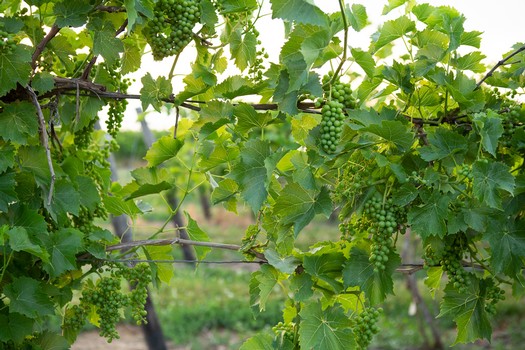Vineyards & Stewardship

Grape Varieties
The Johnson family farm consists of over 300 acres of land bisected by Freelings Creek, which drains into nearby Lake Erie. The care given to the farm and its natural resources, including its meadows, creeks, and woodlands, reflects our family’s desire to be good stewards of the land for future generations. We select grape seedlings and rootstock appropriate to the region and each vineyard site. We maintain soil health by planting cover crops and mulching with pruned grapevines and grape pomace.
Thirteen varieties of grapes are grown at Johnson Estate in 115 acres of vineyards and include four Labrusca, six French-American hybrid, and three Vinifera varietals (Riesling, Pinot Noir, and Chardonnay) within 3000 feet of the winery. Our grape varieties have been selected for their excellent wine-making quality and suitability for the Lake Erie microclimate. In addition to our estate grapes, we purchase a very limited supply of Vinifera grapes (Cabernet Sauvignon) from Long Island where the microclimate is more suitable for heat-loving Bordeaux type grapes. More details about our varietals.
What's Terroir?
For more than a century, this region has been known as the largest Concord grape growing region in the world and Johnson Estate is located in its center. The environment in which a grape is grown, its terroir, includes the climate, geology, and viticulture methods. The Lake Erie Viticultural Area has excellent grape-growing conditions: a northern latitude that results in long hours of summer sunlight, well-drained sand, gravel and shale soils, and a climate moderated by Lake Erie and the hills of the Allegany Plateau which parallel the lake shore. Johnson Estate’s terroir is most like the Rhine and Moselle areas of Germany, both in climate and soils. We manage our vineyards and winemaking so that this special local terroir is expressed to perfection.
Stewardship & Sustainability
At Johnson Estate, we believe that we should be continuously improving the environment that our vines, fields, and woods depend upon. We call it “stewardship”. To us, being good stewards of the land and its creatures means that we not only strive to leave this property (and the broader environment that surrounds it) to its inheritors in a better condition than we came to it, but also that we work with clear focus on improving the growing conditions for vines and woods, season-to-season, year-to-year. Not only is this a foundational value; it is the practical basis for making ever better wines.
Stewardship Goals:
- Achieve and maintain ideal soil conditions for each grape variety
- Invest in irrigation and drainage to maintain ideal water balance
- Utilize two years of biomass soil enhancement using cover crops (sorghum or sunflowers) before planting new vineyards
- Return all grape by-products (skins, seeds, stems, and lees) to the vineyards
- Maintain natural cover crops in the vineyard row centers to prevent erosion and to improve soil habitat
- Avoid and remediate soil compaction as necessary
It also includes the following farm management practices to achieve and maintain ideal canopy and fruit-bunch conditions in our vineyards:
- Continuously improve trellising
- Plant, prune, and thin for ideal leaf-fruit-root balance as well as air-flow
- Apply minimal, targeted protectants to control diseases
- Remove alternate disease hosts from surrounding woods
Johnson Estate is fortunate to be located in a part of Chautauqua County where contracts for electric power are largely (90%*) supplied by ecological hydro-power from Niagara Falls. The winery's warehouse also utilizes passive geothermal construction to be as energy efficient as possible.
*According to the latest Public Utility Report